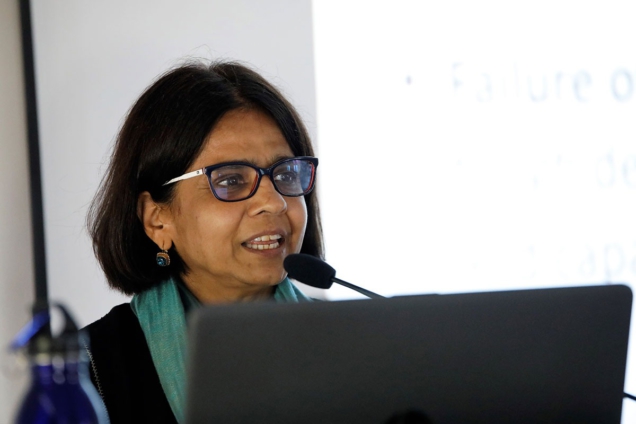Director-General of the Centre for Science and Environment (CSE), Sunita Narain says there is no time to lose on the new Intergovernmental Panel on Climate Change (IPCC) report.
"We can no longer lose time in prevarication or in finding new excuses not to act-including empty promises of net zero by 2050," says Narain.
The Director-General was reacting to the latest IPCC report that confirms that the world can no longer lose time in prevarication or in finding new excuses not to act, including empty promises of net zero by 2050.
The report on Climate Change is the first part of its sixth assessment report that sounds like a grave warning.
Narain listed a couple of key points from the report. The first is that the world might be hurtling towards a 1.5°C temperature rise by 2040.
The second is the main trigger for climate change is, undoubtedly, human activities; and the last point has to do with the efficiency of sinks to absorb emissions going down.

The IPCC report indicates, "There are no “maybes” anymore. The threat of climate change is real; dangers are imminent and the future is catastrophic."
Narain is therefore calling on the world to demands effective global leadership adding that, the report coming from the normal conventional and conformist world of buttoned-up scientists, should scare the world into action—real and meaningful.
"The question is if we are listening. If action is being taken at the scale and pace needed. This is still not happening."
According to her, the relative efficiency of sinks—the earth’s natural cleaning system, the oceans, forests and soils, will go down in the coming years as emissions continue to rise.
"Currently, oceans, land and forests together absorb some 50 per cent of the emissions released into the atmosphere each year. In other words, without these sinks, we would have already breached the 1.5°C warming by now."
Narain also observes that the “net zero” plans of countries will have to be revisited.
Under the net-zero plan, countries such as the US and China have declared that their emissions will remain below what their terrestrial sinks or carbon capture technologies will be able to clean up by 2050 and by 2060 respectively.
"But what this report also tells us is that we cannot “bank” on the sinks to clean up the emissions in the future at this same rate," Narain stated.
The Director-General of the Indian-based organization indicates countries will have to work harder to plant more trees to sequester carbon dioxide, per IPCC release, it means the sinks have reached their tipping points.
"Therefore, this report from global scientists must be a wake-up call. It is time we got serious and started meaningful action on the ground—today."
For Nurain, the good news, however, is that technologies are available to disrupt the current fossil fuel-driven industrial system.
"We do not have to wait for disruptive technologies. Instead, we have to be disruptive in action. The problem is that even today the action on the ground is too little and too late."
Greenhouse gas emissions are expected to rise as countries, impacted by the Covid-19 pandemic, rush to return to normal.
Nurain says the world must reduce greenhouse gas emissions by 45-50 per cent below the 2010 level by 2030 and achieve net-zero by 2050.
"We need hard and drastic action. This is where the scientists, being scientists, cannot call out the most inconvenient of inconvenient truths. There is no doubt that top contributors to climate change are a handful of countries – the US and China, put together, add up to roughly half the world’s annual emissions."
According to her, from 1870 to 2019, the US, EU-27, Russia, UK, Japan and China are responsible for 60 per cent of the global carbon dioxide budget emissions.
"If you take even the Paris targets, the nationally determined contributions (NDCs) of these countries, then in 2030, they will increase their share of the budget to 68 per cent, not decrease it as needed and provide space for the rest of the world to grow.
"This is because their targets are abysmally low and disproportionate to the contribution to the problem and that China will increase its share of CO2 emissions – going from 10 Gt/CO2 to 12 Gt/CO2 annually in the coming decade," she said.
Latest Stories
-
Government asked to address issues of financial mismanagement within SOEs
13 mins -
Full text: Akufo-Addo acts on KPMG’s findings and recommendations on transactions between GRA and SML
20 mins -
UEFA U-17: Ghana’s Black Starlets to play Russia in opener
24 mins -
Mrs. Gertrude Pabi Wiredu
28 mins -
Veteran Nigerian actor Zulu Adigwe is dead
29 mins -
Pioneering Oral Health: Pepsodent’s 2023 Teledentistry initiative and its path forward
39 mins -
Kumasi International Airport will open to traffic in June – Transport Minister
45 mins -
Zack Orji gives details on his health condition, brain surgeries
1 hour -
Only 3 people defected from Movement for Change to NPP – Hopeson Adorye
1 hour -
OISL holds forums for SMEs and Microloan clients in Accra and Kumasi
1 hour -
Cause of current ‘dumsor’ is financial; ECG can’t publish load-shedding timetable – Kofi Kapito
1 hour -
SML/GRA contract brought ¢2.45bn in tax revenues to the state – KPMG report
1 hour -
Paris 2024: France ready to host Ghana and rest of world – France Sports Ambassador
2 hours -
KPMG audit reveals ¢1bn paid to SML for revenue mobilisation services from 2018 until suspension
2 hours -
Renegotiate SML contract – Akufo-Addo to GRA, Finance Ministry
2 hours

